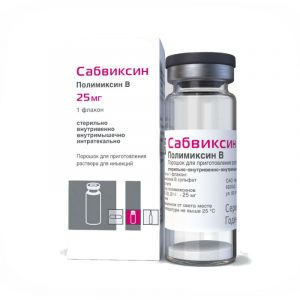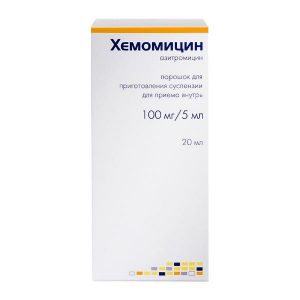Description
Release form
powder for oral suspension
Packing
10 pcs.
Pharmacological action
Amosin is a broad-spectrum antibiotic of the group of semisynthetic penicillins. It is bactericidal. It inhibits transpeptidase, disrupts the synthesis of peptidoglycan (a supporting polymer of the cell wall) during the period of division and growth, and causes lysis of bacteria. Acid resistant.
Active against aerobic gram-positive bacteria: Staphylococcus spp. (with the exception of penicillinase producing strains), Streptococcus spp. aerobic gram-negative bacteria: Neisseria gonorrhoeae, Neisseria meningitidis, Bacillus anthracis, Listeria monocytogenes, Helicobacter pylori, Klebsiella spp.
Penicillinase-producing microorganisms are resistant to amoxicillin.
The action develops 15-30 minutes after administration and lasts 8 hours
Indications
Infectious and inflammatory diseases, caused by microorganisms sensitive to the drug: – respiratory infections (including bronchitis, pneumonia)
– infections of the ENT organs (including sinusitis, pharyngitis, tonsillitis, acute otitis media)
– infections of the genitourinary system (in t including pyelonephritis, pyelitis, cystitis, urethritis, gonorrhea)
– gynecological infections (including endometritis, cervicitis)
– gastrointestinal tract infections (including peritonitis, enterocolitis, typhoid fever, cholangitis, cholecystitis)
– infections of the skin and soft tissues (including erysipelas, impetigo, secondarily infected dermatoses)
– leptospiro
– listeriosis
– Lyme disease (borreliosis)
– dysentery
– salmonellosis, salmonella carriage
– meningitis
– endocarditis (prevention)
– sepsis
Contraindications
– allergic diathesis
– bronchial asthma, hay fever
– infectious mononucleosis
– lymphocytic leukemia
– hepatic gastrointestinal disease (especially antibiotic lactation) sensitivity to the components of the drug
– hypersensitivity to other penicillins, cephalosporins, carbapenems)
With caution, the drug should be prescribed during pregnancy, kidney failure Precision as well as with a history of bleeding.
Special instructions
During the course of treatment with Amosin, it is necessary to monitor the state of the function of the blood, liver and kidneys.
The development of superinfection is possible due to the growth of microflora insensitive to amoxicillin, which requires a corresponding change in antibiotic therapy.
In the treatment of patients with bacteremia, a bacteriolysis reaction (Yarish-Herxheimer reaction) rarely develops.
In patients with hypersensitivity to penicillins, cross-allergic reactions with cephalosporin antibiotics are possible.
When treating mild diarrhea with Amosin, avoid prescribing antidiarrheal drugs, reducing intestinal motility, kaolin or attapulgite-containing antidiarrheal agents can be used. In severe diarrhea, it is necessary to conduct a differential diagnosis and prescribe appropriate therapy.
Treatment should be continued for another 48-72 hours after the disappearance of the clinical signs of the disease.
With the simultaneous use of estrogen-containing oral contraceptives and amoxicillin, additional contraceptive methods should be used if possible.
Composition
1 the bag contains 250 mg of amoxicillin (in the form of a trihydrate).
Dosage and administration of Amrosin
taken orally, before or after meals. The dosage regimen is set individually, taking into account the severity of the disease, the sensitivity of the pathogen to the drug, the age of the patient.
Adults and children over 10 years old (with body weight> 40 kg) are prescribed 500 mg 3 times a day, and in severe cases of the disease – 0.75-1 g 3 times a day.
Children from 5 to 10 years of age are prescribed 250 mg 3 times a day, from 2 to 5 years old – 125 mg 3 times a day, up to 2 years of age – 20 mg / kg / day in 3 divided doses. The course of treatment is 5-12 days. For children under the age of 5 years, the drug is prescribed in the form of a suspension.
For the treatment of acute uncomplicated gonorrhea, Amosin is prescribed in a dose of 3 g once in the treatment of women, it is recommended that a repeated dose of this dose be taken.
In acute infectious diseases of the gastrointestinal tract (paratyphoid fever, typhoid fever) and biliary tract, with gynecological infectious diseases, adults are prescribed 1.5-2 g 3 times a day or 1-1.5 g 4 times a day.
With leptospirosis, adults are prescribed 500-750 mg 4 times a day for 6-12 days.
With salmonella carriage for adults – 1.5-2 g 3 times a day for 2-4 weeks.
For the prevention of endocarditis with minor surgical interventions, adults are prescribed a dose of 3-4 g 1 hour before the procedure. If necessary, a repeated dose is prescribed after 8-9 hours. In children, the dose is halved.
In patients with impaired renal function (CC from 15 to 40 ml / min), the interval between doses is increased to 12 hours, in the terminal stage of chronic renal failure (CC
Rules for the preparation of suspension
Pour boiled and chilled water in the required amount in a clean glass, then pour the contents of one packet and mix until a homogeneous suspension is obtained.
Dose 125 mg – 2.5 ml of water,
dose of 250 mg – 5 ml of water,
dose of 500 mg – 10 ml of water.
After taking, rinse the cup with water, dry and store in a dry, clean place.
Side effects
Allergic reactions: possibly – urticaria, skin hyperemia, erythema, angioedema, rhinitis, conjunctivitis rarely – fever, joint pain, eosinophilia, exfoliative dermatitis, exudative serum syndrome, erythema multiforme, erythema multiforme, erythrocytes, the disease in isolated cases is anaphylactic shock.
From the digestive system: dysbiosis, taste change, vomiting, nausea, diarrhea, stomatitis, glossitis, impaired liver function, moderate increase in hepatic transaminase activity rarely – pseudomembranous enterocolitis.
From the side of the central nervous system and peripheral nervous system: agitation, anxiety, insomnia, ataxia, confusion, behavior change, depression, peripheral neuropathy, headache, dizziness, convulsive reactions.
From the urinary system: rarely – interstitial nephritis.
From the hemopoietic system: leukopenia, neutropenia, thrombocytopenic purpura, anemia.
Other: shortness of breath, tachycardia, vaginal candidiasis, superinfection (especially in patients with chronic diseases or reduced body resistance).
Storage conditions
Keep out of the reach of children, in a dry, dark place. Powder for suspension should be stored at a temperature not exceeding 25 ° C.
Active ingredient
Amoxicillin
Terms and conditions
prescription
lekarstvennaja form
powder pryema inside
Appointment
children on prescription, For adults as prescribed by a doctor



